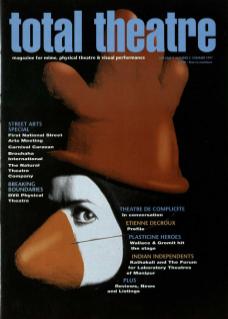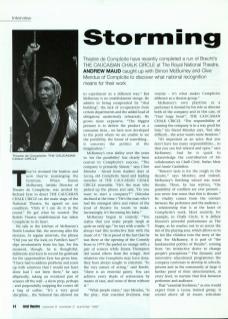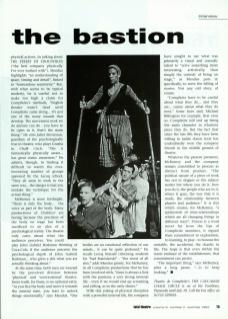They've stormed the bastion and now they're rearranging the furniture. When Simon McBurney, Artistic Director of Theatre de Complicite, was invited by Richard Eyre to direct The Caucasian Chalk Circle on the main stage of the National Theatre, he agreed on one condition, ‘Only if I can do it in the round.’ He got what he wanted. The British Theatre establishment has taken Complicite to its heart.
We talk in the kitchen of McBurney's North London flat, the morning after the election. At regular intervals, the phrase ‘Did you see the look on Portillo's face?’ slips involuntarily from his lips. For the moment, though, he is thoughtful, deliberate and keen to record his gratitude for the opportunities Eyre has given him. ‘I have had to address problems and come up with solutions that I would not have done had I not been there,’ he says elliptically, taking an oversized pair of scissors off the wall – a show prop, perhaps – and purposefully snipping the corner off a bag of coffee. ‘It's a very good discipline... the National has allowed me to experiment in a different way.’ But McBurney is no establishment stooge. He admits to being exasperated by ‘that building’, the lack of cooperation from certain departments and the added load of obligatory understudy rehearsals. He grows more expansive. ‘The biggest pressure is to deliver the product as a consumer item... we have now developed to the point where we are unable to see the possibility, the future of something... it concerns the politics of the imagination.’
McBurney's own ability over the years to see the ‘possibility' has clearly been central to Complicite's success. ‘The company is primarily Simon,’ says Clive Mendus – friend from student days at Lecoq, old Complicite hand and leading member of The Caucasian Chalk Circle ensemble. ‘He's the man who picked up the phone and said, “Do you want to start a company?”’ (Mendus declined at the time.) ‘He's the man who's had the strongest drive and vision of the kind of theatre he wants to make. Increasingly, it's becoming his baby.’
McBurney began in comedy. ‘You realise that you make people laugh at quite an early age,’ he says with a smile. ‘I always had this instinctive link with the music of it.’ He is proud of the fact that he was there at the opening of the Comedy Store in 1979 (he peeled an orange with a pair of scissors while Emma Thompson did sound effects from the wings). And whatever else Complicite may have done, they have always sought to entertain. ‘In the very nature of acting,’ said Brecht, ‘there is an essential gaiety. You can achieve every shade of seriousness by means of ease, and none of them without it.’
‘What people enjoy,’ says Mendus, ‘is the play... that essential liveliness, that vitality – it's what makes Complicite different as a theatre group.’
McBurney's own playtime as a performer is limited by his role as director both of the company and in this case, of ‘that huge beast’, The Caucasian Chalk Circle. ‘The responsibility of running the company is in a way good for him,’ his friend Mendus says, ‘but also difficult... the actor wants more freedom.’
‘It's important as an actor that you don't have too many responsibilities... So that you can feel relaxed and open,’ says McBurney. And he is quick to acknowledge the contribution of his collaborators on Chalk Circle, Stefan Metz and Annie Castledine.
‘Simon's taste is for the rough in the theatre,’ says Mendus; and indeed, McBurney's finishing school was street theatre. There, he has written, ‘the possibility of conflicts are ever present... you never lose sense that this is theatre’. Its vitality comes from the contact between the performer and the audience – a relationship that is at the heart of Complicite's work. Most recently, for example, in Chalk Circle, it is Jeffery Kissoon's powerful performance as The Singer, as he reaches out to us across the rim of the playing area, which allows us to be led like children into the story of the play. For McBurney, it is part of ‘the fundamental politics of theatre’, coming from ‘an instinctive desire to change people's perceptions’. The dynamic and innovative educational programmes the company continues to develop in schools, prisons and in the community at large is further proof of their determination, at every level, to nurture that link between performer and audience.
That ‘essential liveliness’, as one would expect from a Lecoq trained group, is rooted above all in aware, articulate physical actions. In talking about The Street of Crocodiles (‘the best company physically I've ever worked with’), Mendus highlights ‘an understanding of space, timing and detail’, linked to ‘tremendous sensitivity’. But, with what seems to be typical modesty, he is careful not to make too high a claim for Complicite's methods: ‘English theatre wasn't dead until Complicite came along... it's just one of the many strands that develop. The movement work we do anyone can do – you have to be open to it, that's the main thing.’ He cites Juliet Stevenson, guardian of the psychologically true in theatre, who plays Grusha in Chalk Circle. ‘She is fantastically physically aware... has great comic awareness.’ He admits, though, to finding it difficult to watch the ever-increasing number of groups spawned by the Lecoq school: ‘They all seem to work in the same way... the danger is that you mistake the technique for the actual thing.’
McBurney is more forthright. ‘There is only the body... the voice as part of the body. Many productions of Chekhov are boring because the precision of the body on stage has been sacrificed to an idea of a psychological reality. The theatre only cares about what the audience perceives. You could play John Gabriel Borkman thinking of Coca-Cola if the audience perceive the psychological depth of John Gabriel Borkman... who gives a shit what you are actually thinking about.’
At the same time, both men are wearied by the perceived division between 'physical' and 'conventional' theatre. Inner truth, for them, is no optional extra. ‘As you free the body and move it towards the neutral state, you start to unlock things emotionally,’ says Mendus. ‘Our bodies are an emotional reflection of our minds... it can be quite profound.’ He recalls Lecoq himself criticising students for ‘bad Stanislavski’ – ‘the worst of all sins,’ adds Mendus grimly. For McBurney, in all Complicite productions that he has been involved with, ‘there is always a link with the passions, a very strong internal life – even if we would end up screaming and yelling, as in the early shows’.
With this yoking of physical discipline with a powerful internal life, the company have sought to use what was primarily a visual and comedic talent to ‘serve something more interesting, artistically, than simply the comedy of being on stage’, as Mendus puts it; specifically, to serve the telling of stories. Not any old story, of course.
‘Complicite have to be careful about what they do... and they are... canny about what they do next.’ Some have said, Michael Billington for example, that even so, Complicite still end up being the main character in whatever piece they do. But the fact that since the late 80s they have been willing to tackle classic texts has undoubtedly won the company friends in the middle ground of theatre.
Whatever the present pressures, McBurney and the company remain committed to process as distinct from product. ‘The political nature of a piece of work lies not in slogans or the subject matter but where you do it, how you do it, the people who are in it, where it goes, the way that it is made, the relationship between players and audience. It is this which creates, for McBurney, ‘a spider’s web of inter-relationships which are all changing things in different ways’. Process is a word never far from the lips of Complicite members, it signals their commitment to exploration, to learning, to play – to honour the unstable, the accidental, the chaotic in life. The hope is that even within the warm embrace of the establishment, that commitment can persist.
‘The important thing,’ says McBurney, after a long pause, ‘...is to keep looking.’
Theatre de Complicite's The Caucasian Chalk Circle is on at the Pavilions, Plymouth until 10 July.


